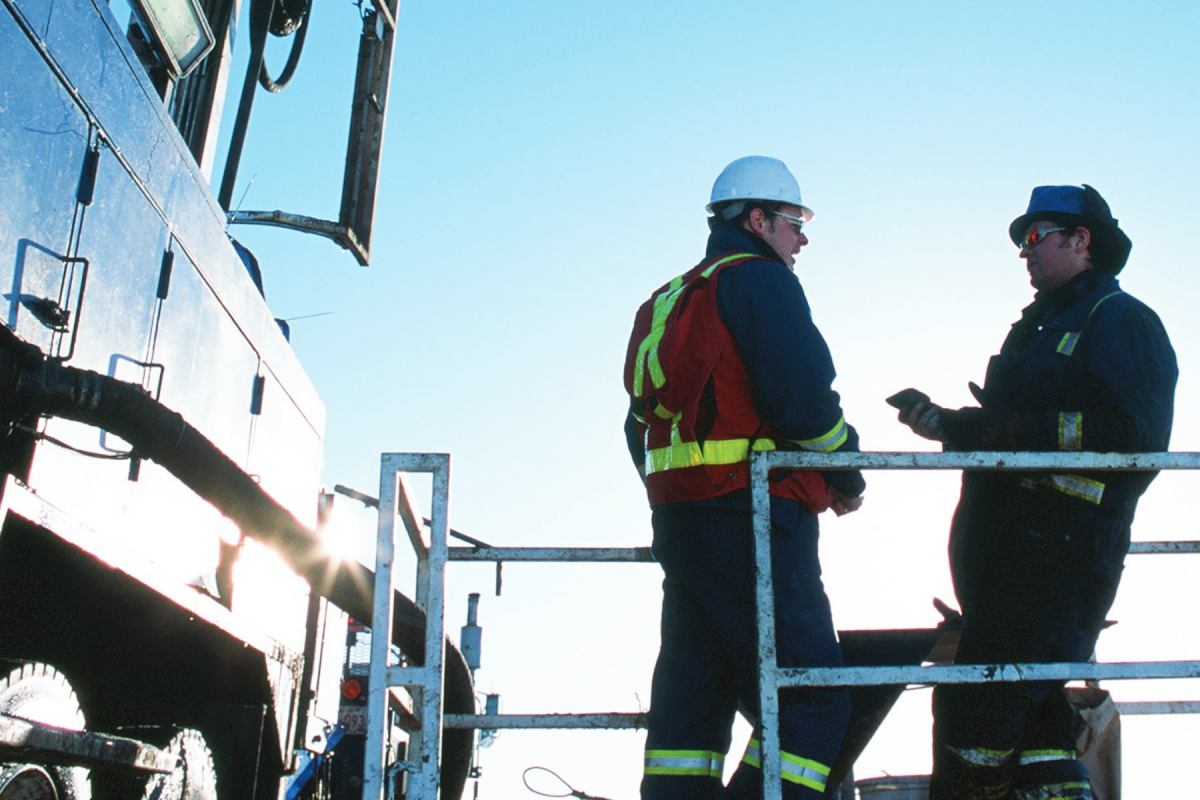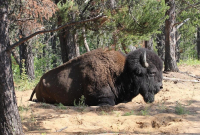Support strong Canadian climate journalism for 2025
A massive new oilsands project is inching closer to getting built in Alberta, despite serious concerns about its detrimental effect on bison herds and the rights of Indigenous people living nearby.
Only the federal environment minister’s approval stands in the way of Teck Resources' $20-billion, 260,000-barrel-per-day Frontier project, which would be the first new open-pit petroleum-mining construction in the country's oil patch in many years.
But approval this year will be a tricky undertaking, with Prime Minister Justin Trudeau’s Liberal government struggling in its eagerness to present itself as capable of both protecting the environment and boosting the economy.
A joint review panel from the Alberta Energy Regulator and the Canadian Environmental Assessment Agency last week delivered its verdict on the Frontier project to the minister, Catherine McKenna, who must now choose whether to approve or reject the project before an October election or risk not getting to make the decision at all.
That extensive report says the 292-square-kilometre site north of Fort McKay is in the public interest despite "significant adverse project and cumulative effects on certain environmental components and Indigenous communities."

"We find that the project is likely to result in significant adverse environmental effects to wetlands, old-growth forests, wetland- and old-growth-reliant species at risk, the Ronald Lake bison herd and biodiversity," it says.
The Ronald Lake bison is a small population of disease-free wild bison that Indigenous Peoples in the area hunt for food. According to the report, the animals’ range includes the project's almost 30,000-hectare footprint, and there is concern the project could prompt the herd to move northward into Wood Buffalo National Park, where they could come into contact with herds known to carry bovine tuberculosis or brucellosis.
"It would have significant consequences for the herd and the asserted rights, use of lands and resources, and cultural practices of Indigenous communities who are connected to the herd," the report says.
McKenna to review panel's verdict
McKenna thanked the panel for “their diligent work through an exhaustive review process" in a statement supplied by her office, which repeated assertions that the government was serious about protecting the environment, fighting climate change, and advancing reconciliation with Indigenous peoples, as well as supporting good jobs and economic opportunities for middle-class Canadians.
Teck says the project will create 7,000 jobs during construction and require up to 2,500 workers during operation.

The company, Canada’s largest diversified miner, mostly produces copper, metallurgical coal and zinc worldwide, but has recently built some Canadian oil and gas exposure. It expects the project to produce about 3.2 billion barrels of bitumen over four decades of life. The company expects to pay around $12 billion in federal taxes during that time, as well as $55 billion to Alberta in taxes and royalties and $3.5 billion in municipal property taxes.
If McKenna decides the risks outlined in the report are too great, it will be up to cabinet to determine whether those effects are justified. The federal government has until Feb. 28 to make its decision.
Teck said it does not expect the regulatory process to be completed until early in 2020, by which time a new federal government should be in place.
A spokesman for the federal Conservative Opposition did not respond to questions about whether a Conservative government would approve Frontier as it is currently configured or how it would plan to offset the environmental and other impacts.
But Alberta's recently elected United Conservative Party government of Jason Kenney said the panel's decision was "an encouraging step that shows investors Alberta is open for business."
The provincial government is committed to "managing our energy resources to ensure the best possible return for Albertans," said Christine Myatt, Kenney's press secretary.
She said that the province's government is committed to a balanced approach to resource development that thoughtfully manages air, water, land, plants, fish and wildlife.
Teck delayed its planned startup of Frontier in 2015, when crude prices were at multi-year lows. The company said then that it would begin drilling in 2026 rather than the initial 2021 plan.
Echoes of Trans Mountain
The Liberal government has already made significant efforts to get one mega-project out of the plans and into the ground, approving the Trans Mountain pipeline expansion for a second time in June, after stepping in to purchase the troubled project from Texas-based Kinder Morgan for $4.5 billion.
That repeat performance came after a federal court last year threw out its first approval, saying the government had failed in its duty to consult with affected Indigenous communities and to consider the impact of increased tanker traffic in the waters around Vancouver on southern resident killer whales.
The joint report on Frontier, meanwhile, also said that the project was likely to significantly affect the "asserted rights, use of lands and resources and culture of Indigenous groups who use the project area" and that the "proposed mitigation measures have not been proven to be effective."
Teck says that it has reached agreements around environmental stewardship and economic opportunities with all 14 Indigenous communities in the broader project area, including the Athabasca Chipewyan First Nation, Mikisew Cree First Nation and Fort McKay First Nation.
But it is still not sure it will go ahead with the project, despite pushing through the regulatory process.
"Any further decisions on the project will depend on factors including our review of the Joint Review Panel report, the outcome of the regulatory process which is not expected to be completed until the first quarter of 2020, market conditions and other considerations," spokesman Chris Stannell said in an emailed response to questions.
The Institute for Energy Economics and Financial Analysis said late last year that Teck appeared "ill-equipped and ill-prepared to take on such a mega-project" and that neither an increase in the oil price increases nor production cost declines for the project are likely to be enough to improve its financial prospects.




Comments
Approval of this project will surely be proof positive that Trudeau's persona as an environmentalist is phonier than was his blackface debacle. www.PlanetInPeril.ca